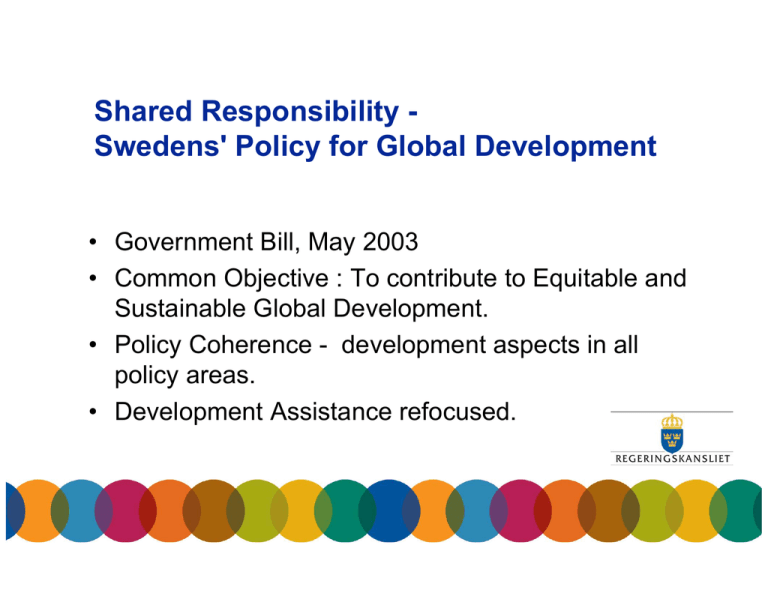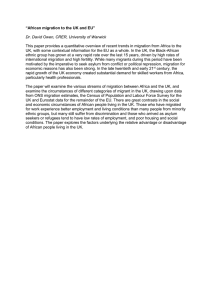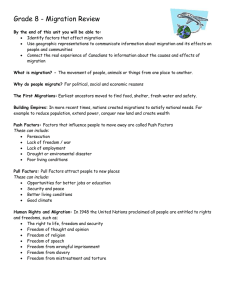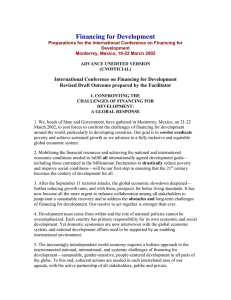Shared Responsibility - Swedens' Policy for Global Development
advertisement

Shared Responsibility Swedens' Policy for Global Development • Government Bill, May 2003 • Common Objective : To contribute to Equitable and Sustainable Global Development. • Policy Coherence - development aspects in all policy areas. • Development Assistance refocused. A Common Global Agenda • • • • UN Millennium Declaration Millennium Development Goals The WTO ministerial conference in Doha The International Conference on Financing for Development in Monterrey • The World Summit on Sustainable Development in Johannesburg All Policy Areas Matter • • • • • • • • • • • Legal issues and policy Security and Defence policy Trade and business investment policy Migration policy Social welfare and public health policy Economic financial policy Education policy Agriculture and fisheries policy Cultural policy Environmental policy Industrial and employment policy A Rights Perspective • All human beings are born free and equal in dignity and rights • Democracy and human rights reinforce each other • Gender equality • Children's rights The Perspective of Poor People • The priorities of the poor • The poverty reduction strategies are vital • A shift in focus from rich countries to the poor, from governments to individuals Central Elements of the Policy • • • • • • • • Respect for human rights Democracy and good governance Gender equality Sustainable use of natural resources and environmental protection Economic growth Social development and social security Conflict management and human security Global public goods Global Public Goods (GPG) • International Task Force on GPG • Defining International Public Goods • Priorities in the provision of international public goods for development: - selection of key international public goods - learning lessons from past experience: management and financing • Recommendations for future actions Policy Coherence • All central government ministries involved in the writing of the bill • Next steps : - Further analysis in certain areas (GPG, migration, conflict prevention, agriculture and private sector) - Implementation of recommendations - Organisational consequences A New Focus for Swedish Development Co-operation • Objective : To contribute to an environment supportive of poor people's own efforts to improve their quality of life • Development co-operation is a complement to partner countries' and counterparts' own efforts Increased Efficiency of Development Co-operation • Concentration to fewer sectors and areas • No Program Countries - increased co-ordination with other donors, international organisations, civil society etc. • No sharp division between bilateral and multilateral assistance • Harmonisation of procedures and routines • Untying of development assistance Learning From Each Other • An Annual Report from the Government to the Parliament on the implementation of the policy for Global Development • A Citizens' Forum to be created • Independent Evaluation Policy Coherence Research by EGDI (Expert Group on Development Issues) • Some current topics: - Migration Regimes and Economic Development - Security and Development - Special and Differential Treatment of Developing Countries in the WTO - The Multilateral System for Development Financing EGDI - Migration and Development - Development impact of international migration for work. - How do migration policies of rich receiving countries affect the economic development of lowincome sending countries. - The study is structured around four regional case studies, each representing different migration patterns or regime. EGDI - Security and Development - Analyse the intersection between conflict prevention, security and development. - How can donors act in a post-conflict situation in order not to encourage a return to conflict? - Is there a relationship between a "securitization" of a sector (or country) and the level of investment? - Can, and if so how, traditional military security measures promote development? EGDI - Multilateral Development Financing - Analyse the multilateral system for development financing, review recent political initiatives and propose a vision for a more effective system. - Analyse the roles and comparative advantages of the international financial institutions, UN, EU etc. - Key characteristics: adequacy of finance, predictability, security of access to finance, efficiency, flexibility of institutional mechanisms, developing countries' voice and representation in governing bodies. EGDI - International Trade - Special and Differential Treatment (SDT) of developing countries within the WTO - Analyse an ideal system and a political realistic framework of SDTs in the WTO - How can SDTs promote development ? - What are the relevant principles for the SDT rules? - What are the potential synergies between different SDT rules?





